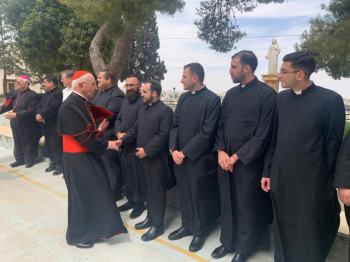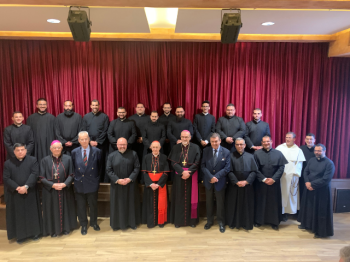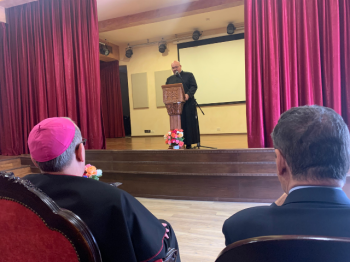Seminaries are an essential reality in the life of every diocese
 Cardinal Filoni greets Latin Patriarchate seminarians and their teachers in May 2022.
Cardinal Filoni greets Latin Patriarchate seminarians and their teachers in May 2022.
The perception we always have from outside is that seminaries are an unchanging body with a perennial mandate. Father Bernard Poggi, rector of the Seminary of Beit Jala helped us to see how much tradition and innovation come together in the vital work of supporting future priests in the discernment of their path and preparing for their journey.
The New “Ratio Fundamentalis Institutionis Sacerdotalis – The Gift of the Priestly Vocation” greatly impacted how the Seminary of the Diocese of Jerusalem conceives itself and realigned its educational framework.
Father Poggi explains: “According to the Ratio Fundamentalis Institutionis Sacerdotalis (RFIS), which was Promulgated on the Feast of the Immaculate Conception (December 8, 2016), the manner in which we focus on how formation is given, has changed. It went from the focus on four main aspects: academic, spiritual, human and Seminaries are an essential reality in the life of every diocese pastoral to the application of formation in four stages: The Propaedeutic Stage, the Stage of Philosophical Studies (or Discipleship), the Stage of Theological Studies (or Configuration to Christ) and finally the Pastoral Stage (or Vocational Synthesis).”
The focus on integrated formation has shaped the way the Seminary is accompanying these young men in their path to priesthood. Certainly, each stage has a specific emphasis but the process is a whole. In this path the Order of the Holy Sepulchre silently supports the endeavour and action of this key institution of the Church of Jerusalem with a monthly contribution of about $ 60,000 and is very close to both seminarians and priest formators who are living their ministry there.
During the Propaedeutic Stage, Father Poggi tells us, “there is a human-spiritual emphasis; a time in search for the Lord: quaerere domini. In this, the year focuses heavily on vocational discernment, on self-knowledge and on how to live an authentic Catholic spirituality.” The Stage of Philosophical Studies “is constitutive to helping answer the most fundamental questions, such as those about existence, reason, knowledge, values, mind, and language. This period is also designed to help the student understand the scientific methodology of study and research in the field,” he continues. During the Stage of Theological Studies, “it becomes necessary for the seminarian to focus on how to become even more configured to the image of Christ, in persona Christi”. This time is offering a higher theological instruction and, Father Poggi, explains, “it is during this stage that we send our students for one year to attend St. Joseph’s Seminary in Yonkers, New York. In addition to the courses which they take while in the United States, the seminarians become aware of how the church works in other parts of the world. There, they are introduced to a very different pastoral reality.”
Finally, the Pastoral Stage is one of “vocational synthesis” and supports seminarians in concretely understanding what happens in the everyday life of a priest and “how to work with the parish priests in parish activities, setting and executing pastoral plans, engaging with young people, organizing Sunday masses and their associated ministries of liturgical chant, altar service, etc,” the rector of the seminary concludes.
Currently there are 20 seminarians in the major seminary (17 for the Latin Patriarchate and 3 for the Melkites from the Archdiocese of Akko) who are in various stages of their formation. The staff is composed by the Rector, Father Bernard Poggi, plus other four priest formators. This team also follows “23 seminarians who were in the minor seminary which has been closed since Corona Virus. They are now living with their respective families and are followed by the director of vocations, who visits them from time to time ensuring that things are going well for them,” Father Poggi shares.




 Father Poggi (center, to the right of Cardinal Filoni) welcomed the Grand Master and the Order's leadership during their visit to Beit Jala Seminary.
Father Poggi (center, to the right of Cardinal Filoni) welcomed the Grand Master and the Order's leadership during their visit to Beit Jala Seminary.
